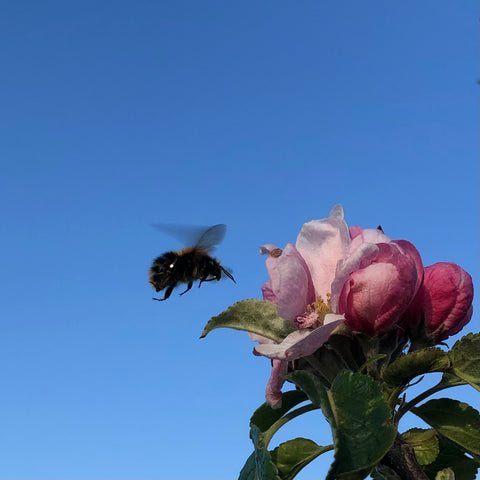
Blooms Not Beewash
Share

We're buzzzzzed to be sponsoring the Bumblebee Conservation Trust stand again at the Chelsea Flower Show. I can't wait for my volunteering day; it's so energising to talk to fellow bee enthusiasts!

Like last year, the message is going to be about bumblebee friendly plants (here the gorgeous heritage apple variety 'Annie Elizabeth', btw). It's just the sort of thing we've been banging on about for years too. Growing the right plants the right way - without chemicals - is the best thing us gardeners can do for bees.
At the other end of the spectrum, the most useless is bumblebee "hives"*.
There's been a business supplying bumblebee colonies for commercial tomato growers for many years. Tomatoes rely on buzz pollination by bumblebees, and in greenhouses there aren't many around. Someone came up with the idea of importing and selling small colonies of bees in boxes to do the work, and so successful were they that other growers used them too - for strawberries, for example.
This isn't great news for bumblebees for a number of reasons, not least biosecurity. As a commercial grower you now need a licence to import non-native subspecies of Bombus terrestris, which among other things requires the bees to be disease free and killed at the end of the season. This led to suppliers switching to the native subspecies, B. terrestris audax. This still isn't great; these bees can carry parasites and diseases, which will infect local colonies. The Bumblebee Trust has a position paper on this. It may also be that extra competition for finite resources might threaten wild populations.
Defenders of this trade say that as the bees are kept in enclosed spaces - i.e. greenhouses - it doesn't matter, but of course no greenhouse is completely bee proof, nor can growers be relied on to kill all the new generation of queens at the end of the season.
These bee colonies are now sold for gardeners. To what end are people buying them? I had a marketing email this week from one supplier selling teeny tiny boxes recommended for use for allotments. They are "suitable for hobby or garden use", apparently.
This is bizarre. There's no practical reason to be buying this stuff unless you're a tomato grower with acres of glass. It's not going to improve the yield of your veg on the allotment, and if you bought a colony of bumblebees and trapped them in a domestic greenhouse to pollinate tomatoes they would die in short order. There are plenty of wild pollinators about, and the whole domestic trade is just more beewash.
So why does it exist? The gardeners I talk to at Chelsea who buy them (repeatedly, and with a special wooden box, treatment for wax moth, etc. etc. - you get the picture) think they're doing it to "save the bees" in some way. We do love stuff - or, rather, we're encouraged to believe in the power of stuff.
It's up to folk like the Trust to get the message across that it's plants that are going to save bees, not boxes of bees.
*I know it's daft; only honeybees have hives.


